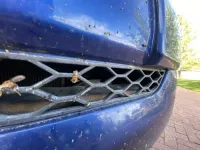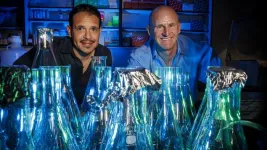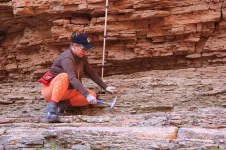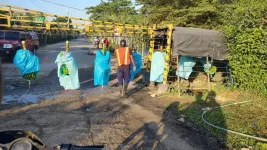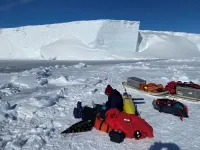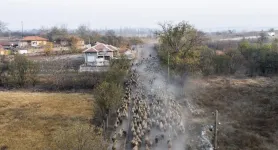(Press-News.org) LOGAN, UTAH, USA -- When a large mammal such as a deer or a moose is struck by a motor vehicle, the damage is usually dramatic. To reduce these unfortunate events, transportation officials have teamed with wildlife researchers to place warning signs, and to construct wildlife underpasses and overpasses, to mitigate mishaps along animal migration paths.
In contrast, collisions with much smaller bees often go unnoticed or are perceived by motorists as simply an annoying splat on a windshield. The significance, Utah State University researcher Joseph Wilson argues, is much greater.
“Bees play a pivotal role in our in ecosystem,” says Wilson, an evolutionary ecologist and professor in the Department of Biology at USU Tooele. “The consequences of their frequent collisions with vehicles extend well beyond a minor travel inconvenience. In fact, the impacts of bee deaths, occurring minute-by-minute each day, may have a greater negative impact than we realized.”
A new study by Wilson and colleagues suggests tens of millions of bees may perish every day as motorists zoom down busy highways of the western United States. He and USU alums Thomas Porter and Olivia Messinger Carril report preliminary findings in the November 7, 2024 online issue of Sustainable Environment.
“Unlike collisions with larger animals that are easy to measure, it is much harder to detect the extent of bee mortality caused by moving vehicles,” Wilson says.
The team used sticky traps attached to car bumpers and extrapolated the data based on Department of Transportation statistics. Wilson says the large estimated numbers of bees being hit was sobering.
Why is bee mortality along roads so high?
“Roadsides, especially those in arid landscapes, have more flowering plants due to water runoff from roads,” Wilson says.
In the desert, these roadside plant communities often house diverse bee communities. Further, the team’s findings reveal roads with the highest bee mortality estimates are often near national parks, where visitation has sky-rocketed with a steady stream of motor vehicles.
“The quality of the roadside habitat, however, determines if insects stay along the roadside, or if they decide to cross the road, looking for better places to forage,” he says.
Increased awareness of the importance of bees, as well as a growing number of studies suggesting some bee communities are declining, have led public managers and private organization to encourage plantings along roads and in medians.
“This may not be the best solution in all areas, if those plantings encourage in insects to cross roads to access those resources,” Wilson says.
A challenging conundrum, then, is how to you create bee-friendly habitat, without further imperiling bees?
“We’ve raised a lot of questions,” Wilson says. “More research is needed to better understand how roads and roadside habitats are impacting insect movement, along with ways roadway design and maintenance, as well as vehicle designs, can be less detrimental to these pollinators.”
And it’s not all bad news, he says.
“Some studies show healthy roadside habitat facilitates movement of pollinators along the road,” Wilson says. “So, with some awareness, landscapes can be restored along roadways to support pollinator communities and reduce the need for road crossings.”
Still, habitat modification, habitat fragmentation and habitat loss are taking a grim toll on pollinator populations, he says.
“Bees are keystone species that support plant diversity and reproduction,” Wilson says. “Understanding how we can support pollinators at a landscape scale is an important step towards the protection of these important insects.”
END
Sometimes you're the windshield: Utah State University researcher says vehicles cause significant bee deaths
In the Sustainable Environment journal, USU ecologist Joseph Wilson and colleagues report millions of pollinators are killed daily in vehicle collisions along roadways in U.S. western states
2024-11-08
ELSE PRESS RELEASES FROM THIS DATE:
AMS Science Preview: Turbulence & thunderstorms, heat stress, future derechos
2024-11-08
The American Meteorological Society continuously publishes research on climate, weather, and water in its 12 journals. Many of these articles are available for early online access–they are peer-reviewed, but not yet in their final published form.
Below is a selection of articles published early online recently. Some articles are open-access; to view others, members of the media can contact kpflaumer@ametsoc.org for press login credentials.
JOURNAL ARTICLES
A New Heat Stress Index For Climate Change Assessment
Bulletin of the American Meteorological Society
Heat Index may dramatically underestimate heat stress in extreme temperatures. This work compares the ...
Study of mountaineering mice sheds light on evolutionary adaptation
2024-11-08
Teams of mountaineering mice are helping advance understanding into how evolutionary adaptation to localized conditions can enable a single species to thrive across diverse environments.
In a study led by Naim Bautista, a postdoctoral researcher in Jay Storz’s lab at the University of Nebraska–Lincoln, the team took highland deer mice and their lowland cousins on a simulated ascent to 6,000 meters. The “climb” ventured from sea level and the mice reached the simulated summit seven weeks later. Along the way, Bautista tracked how the mice responded to cold stress at progressively lower oxygen levels.
“Deer ...
Geologists rewrite textbooks with new insights from the bottom of the Grand Canyon
2024-11-08
LOGAN, UTAH, USA – Any boomer, gen xer, millennial, gen zer or alpha who’s studied geology has likely gained foundational knowledge from Edwin Dinwiddie McKee’s landmark studies of the Grand Canyon’s sedimentary record – even if they don’t readily recognize McKee’s name.
The legendary scientist, who lived from 1906-1984, studied and documented the stratigraphy and sedimentation of Colorado Plateau geology, especially the Grand Canyon’s Cambrian Tonto Group, for more than 50 years. His time-tested ...
MSU researcher develops promising new genetic breast cancer model
2024-11-08
A Michigan State University researcher’s new model for studying breast cancer could help scientists better understand why and where cancer metastasizes.
Professor https://directory.natsci.msu.edu/Directory/Profiles/Person/103559 who teaches in the MSU Department of Physiology, has been researching the E2F5 gene, of which little is known, and its role in the development of breast cancer. Based on findings from Andrechek’s lab, the loss of E2F5 results in altered regulation of Cyclin D1, a protein linked to metastatic breast tumors after long ...
McCombs announces 2024 Hall of Fame inductees and rising stars
2024-11-08
AUSTIN, Texas — Friends and distinguished alumni of the McCombs School of Business at The University of Texas at Austin inducted four alumni into the school’s Hall of Fame on Nov. 7 at the AT&T Hotel and Conference Center. This year’s honorees are Christopher Bake, BBA ’88; Ray Brimble, B.A. ’74; Bennett Glazer, BBA ’68; and Brien Smith, BBA ’79, MPA '81. McCombs Dean Lillian Mills also recognized 2024 Rising Stars Simeon Bochev, MSF ’13; Michael Ginnings, BBA ’09; and Gerardo Guardado, MBA ’10.
The ...
Stalling a disease that could annihilate banana production is a high-return investment in Colombia
2024-11-08
There’s no cure for a fungal disease that could potentially wipe out much of global banana production. Widespread adoption of cement paths, disinfection stations, and production strategies could net 3-4 USD of benefits for each dollar invested in Colombia.
Hundreds of millions of dollars in banana exports from Colombia are at risk due to a fungal disease best known as Tropical Race 4 (TR4). First detected in Asia in the 1990s, the Fusarium fungus that causes the disease arrived in Colombia in 2019, completing its inevitable global spread to South America, the last major banana production continent that remained TR4-free. Researchers are confident ...
Measurements from ‘lost’ Seaglider offer new insights into Antarctic ice melting
2024-11-08
New research reveals for the first time how a major Antarctic ice shelf has been subjected to increased melting by warming ocean waters over the last four decades.
Scientists from the University of East Anglia (UEA) say the study - the result of their autonomous Seaglider getting accidentally stuck underneath the Ross Ice Shelf - suggests this will likely only increase further as climate change drives continued ocean warming.
The glider, named Marlin, was deployed in December 2022 into the Ross Sea from the edge of the sea ice. Carrying a range of sensors to collect data on ocean processes that are important for climate, it was programmed to travel northward into ...
Grant to support new research to address alcohol-related partner violence among sexual minorities
2024-11-08
Navigating the intersection of alcohol use and intimate partner violence amongst young couples is not an easy journey, and for bisexual+ couples, the road may be even more winding.
“No study has examined the extent to which alcohol use increases intimate personal violence among bisexual+ young adults or daily experiences unique to them. Our study will look at factors such as minority stressors that may lead to alcohol-related partner violence,” said Meagan Brem, director of the Research for Alcohol and Couple’s Health Lab at Virginia Tech.
Alcohol use and intimate partner violence - defined as any action in a ...
Biodiversity change amidst disappearing human traditions
2024-11-08
A Branco Weiss Fellowship – Society in Science has been awarded to Dr Gergana Daskalova. The fellowship funds Daskalova’s research project “Biodiversity change amidst disappearing human traditions and changing socio-economics”. She joins the Department of Conservation Biology at the University of Göttingen to work together with Professor Johannes Kamp. The five-year fellowship, which is worth over €530,000, will enable Daskalova to investigate the ecological and human fingerprints of land abandonment. Considering the question from both a local and a global perspective, Daskalova’s research will reveal what happens to nature when people leave, ...
New approaches to synthesize compounds for pharmaceutical research
2024-11-08
Junior Professor Johannes Walker, University of Göttingen, has been awarded an Exploration Grant from the Boehringer Ingelheim Foundation. Walker teaches and carries out research at the Institute for Organic and Biomolecular Chemistry. The award of 180,000 euros will enable Walker and his team to develop new approaches to synthesizing new compounds.
“The aim of our project is to develop new strategies for the synthesis of a particular group of new chemical compounds,’ Walker explains. These compounds are called saturated polycyclic molecules. They are structurally complex ...
LAST 30 PRESS RELEASES:
Globe-trotting ancient ‘sea-salamander’ fossils rediscovered from Australia’s dawn of the Age of Dinosaurs
Roadmap for Europe’s biodiversity monitoring system
Novel camel antimicrobial peptides show promise against drug-resistant bacteria
Scientists discover why we know when to stop scratching an itch
A hidden reason inner ear cells die – and what it means for preventing hearing loss
Researchers discover how tuberculosis bacteria use a “stealth” mechanism to evade the immune system
New microscopy technique lets scientists see cells in unprecedented detail and color
Sometimes less is more: Scientists rethink how to pack medicine into tiny delivery capsules
Scientists build low-cost microscope to study living cells in zero gravity
The Biophysical Journal names Denis V. Titov the 2025 Paper of the Year-Early Career Investigator awardee
Scientists show how your body senses cold—and why menthol feels cool
Scientists deliver new molecule for getting DNA into cells
Study reveals insights about brain regions linked to OCD, informing potential treatments
Does ocean saltiness influence El Niño?
2026 Young Investigators: ONR celebrates new talent tackling warfighter challenges
Genetics help explain who gets the ‘telltale tingle’ from music, art and literature
Many Americans misunderstand medical aid in dying laws
Researchers publish landmark infectious disease study in ‘Science’
New NSF award supports innovative role-playing game approach to strengthening research security in academia
Kumar named to ACMA Emerging Leaders Program for 2026
AI language models could transform aquatic environmental risk assessment
New isotope tools reveal hidden pathways reshaping the global nitrogen cycle
Study reveals how antibiotic structure controls removal from water using biochar
Why chronic pain lasts longer in women: Immune cells offer clues
Toxic exposure creates epigenetic disease risk over 20 generations
More time spent on social media linked to steroid use intentions among boys and men
New study suggests a “kick it while it’s down” approach to cancer treatment could improve cure rates
Milken Institute, Ann Theodore Foundation launch new grant to support clinical trial for potential sarcoidosis treatment
New strategies boost effectiveness of CAR-NK therapy against cancer
Study: Adolescent cannabis use linked to doubling risk of psychotic and bipolar disorders
[Press-News.org] Sometimes you're the windshield: Utah State University researcher says vehicles cause significant bee deathsIn the Sustainable Environment journal, USU ecologist Joseph Wilson and colleagues report millions of pollinators are killed daily in vehicle collisions along roadways in U.S. western states
